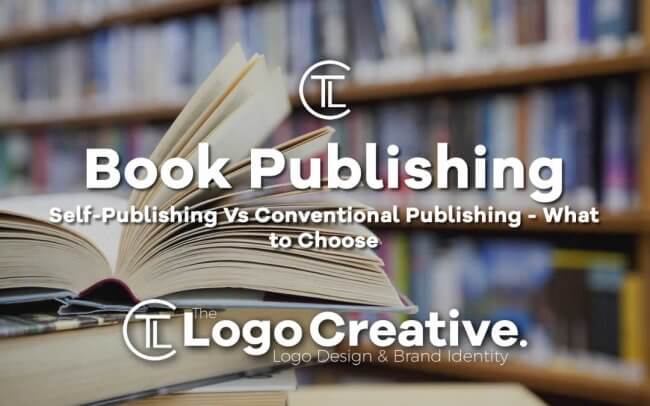No matter how calm and collected about writing you are, it’s all pointless if you don’t publish the book the right way. Why is publishing so important, even more, important than the quality of the book nowadays? In this article, we take a look at Self-Publishing Vs Conventional Publishing – What to Choose
The answer lies in one key topic – book promotion. To establish yourself as a writer and to attract the audience you know you deserve, the book has to be promoted and advertised the right way. So conventional publishing is the way to go, right?
Not quite. The writing community is still in the midst of a heated debate on whether a writer should use self-publishing or conventional publishing as the primary means of promotion for his or her book.
Why is this such a big debate? The answer lies in the problematic concerning writer’s freedom, the importance of commercial success and how viable it is to publish on your own. In this article, we will break down the pros and cons of both approaches and help you come to a conclusion.
Table of Contents
What is self-publishing?
Self-publishing isn’t some new concept that has been started by indie publishing companies. For centuries, writers have had to buy their own paper, ink and pay for the costs of printing. However, writers around the world are still skeptical about self-publishing and its benefits. What are the main reasons for this wave of skepticism?
- A lack of experience with self-publishing. Not too many young writers want to risk it and immediately go towards a big publishing agency. For years, they were bound by a single contract and don’t have the means to experiment with self-publishing at all.
- A need for money. Self-publishing may not be lucrative as conventional publishing and young writers are constantly on the lookout for the best ways to earn money writing. They are usually struggling, so a payment in advance can set them up for multiple months or years.
- Risks. When you’re entering the world of self-publishing, you’re mostly on your own. You have to think of the printing solutions, the platform on which to launch the book and even little details like the design. When you add that to the time needed to write, you have yourself a time-consuming task. Most writers don’t write as a full-time job, so jeopardizing the majority of their day is not an option.
A large number of writers value independence in today’s publishing world and William Piccard, an author and senior consultant at essay service concurs.
“Essentially, young writers lack in education about the industry,” he says. “They don’t know what to expect and how will agents and publishers treat them, so they make a hasty decision to self-publish. It doesn’t always turn out well for them, sadly.”
Why should you choose self-publishing?
Self-publishing is an ideal choice if you aren’t used to functioning on a set timeline. When you choose to self-publish a book, you have no limitations whatsoever. You can start writing whenever you want, write how much you want and finish the work whenever you want.
You have complete freedom and control over your life and writing activities. A lot of writers need this freedom, especially younger ones who aren’t used to a hectic writing tempo and strict deadlines.
Another argument for choosing self-publishing is perhaps the most important – artistic freedom. If you choose to publish your book on Amazon or as a free download, there are no limitations as to what you can put within the pages. There will be no agent or publisher to stop you from expressing yourself, just because they have sales and revenue in mind.
Why not?
To self-publish, you need to be a very organized person who has the talent and courage to experiment and change their schedule all the time. It’s something that always comes with experience and there is no way around it.
Self-publishing is a bad idea because it’s easy to get “swallowed up” by your own schedule. Writers do one of these things in this case:
- They write too much and end up jeopardizing their jobs and daily lives just because they can’t stop. Inspiration is important, but it can also be deadly.
- They go months without writing a single world because they become complacent with their current state. Having the freedom to slack is a luxury a lot of people take too seriously.
Also, there is the ever-important financial factor. Publishing a book is very expensive. The costs don’t include just uploading the book and promoting it, there is also editing.
Don’t forget about design, live readings, appearances, interviews and everything else that’s hard to do on your own. So, is conventional publishing the answer? Let’s take a look.
Why choose conventional publishing?
When a certain system has been in place for decades, it’s easy to learn it and amass the knowledge needed to “join the party.” Conventional publishing is a global network of publishing houses, literary agents and advisors from all corners of the globe.
If you choose to sign a contract, you will be greeted by experienced professionals that can help you with anything you need. They have experience with all sorts of problems and will enrich you as a writer and a marketer of books using that experience.
Organization and management are equally important for a majority of writers. With self-publishing, you never know how your venture is going to go. Did you amass a list of focused goals for your first title? How much do you need for book marketing? These are all questions that you aren’t supposed to answer on your own.
You’re a writer and your focus should be on creating, not thinking about the best ways to market a book. If you have agents and publishers doing that for you, there will be no problem with achieving mental clarity and providing your very best writing.
Money is important, too
Don’t forget about financial support. Every publisher gives authors a sum of money up front, as a signing bonus. If you sign a contract, you can use that signing bonus to quit your job and focus solely on writing for a long period of time.
No matter how versatile you are, the human mind is the most productive when it focuses on one activity and one activity only.
Marketing is perhaps the biggest reason why you should opt for conventional publishing. You will have a whole network of marketers, content writers and analysts that work around the clock to help your book sell as many copies as possible.
Every big publisher uses a service to outsource content, and many independent writers don’t have funds or access to such services.
Why not?
Bureaucracy, paperwork and big publishers are somewhat of a taboo subject in writing circles and it’s not without reason. We’ve seen and heard numerous stories about prospective writers who could have made it big, but instead got trapped in very bad contracts and obligations.
Remember – you’re legally binding yourself to everything that’s written in the contract. How can you be sure that you will be able to write four books and have them sell flawlessly? Never accept any terms that you’re not sure you can realistically achieve.
Big publishers are also known to restrict artists. The agency has a vision and an agenda for what to publish. If your political views, explicit content or a controversial topic appear in the book, they can always say no and make you change it.
In this situation, there is nothing you can do because you’re under contract and they have the right to reject everything they feel like rejecting.
Sometimes, it pays off to work a bit harder and be a free artist, without restrictions and contractual limitations. Art is something that should never be kept in a cage. It’s a bird that’s meant to fly freely.
Concluding thoughts
Self-publishing may give you more control over your creative process and you won’t risk having any changes made to your work. With conventional publishing, you get the guidance of an agent and an entire team of seasoned professionals that know the ins and outs of the industry.
For young writers, it’s always the best to go the safe route. You will get paid more and you will get to learn from older writers and publishers. Once you establish yourself, only then should you experiment with self-publishing. Think about this one real good.
 Author Bio
Author Bio
Michael Gorman is a high skilled freelance writer and proofreader from the UK who currently works at Xpert Writers.

